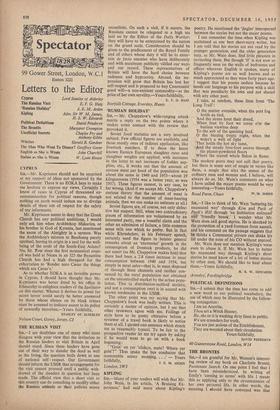KIPLING
SIR,—Many of your readers will wish that Mr. John Wain, in his article, 'A Bruising Ex- perience,' had said more about Kipling's
poetry. He mentioned the 'jingles' interspersed between the stories but not the major poems.
I can remember the time when Kipling was acclaimed as our best short-story writer, but I am told that his stories are not read by the younger generation, and the older generation may, as Mr. Wain does, find little pleasure in re-reading them. But though 'If' is not now so frequently seen on the walls of bedrooms and offices wherever English is spoken, many of Kipling's poems are as well known and as much appreciated as they were forty years ago. I suggest that his poems endure because he bends our language to his purpose with a skill that was peculiarly his own and not shared with any other poet.
I take, at random, these lines from 'The Long Trail': O the mutter overside, when the port fog holds us tied, And the sirens hoot their dread, When foot by foot we creep o'er the hueless viewless deep To the sob of the questing lead.
O the blazing tropic night, when the wake's a welt of light That holds the hot sky tame, And the steady fore-foot snores through the planet-powdered floors Where the scared whale flukes in flame.
The modern poets may not call that poetry, but there is some sort of magic in verses like these, a magic that stirs the senses of the ordinary man and woman and, I believe, will always do so. Mr. Wain's comments on what I have called the major poems would be very interesting.—Yours faithfully,


































 Previous page
Previous page